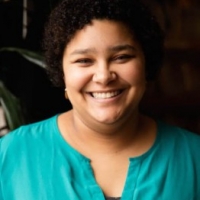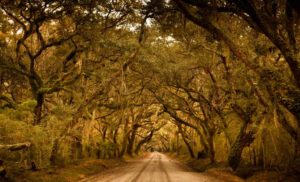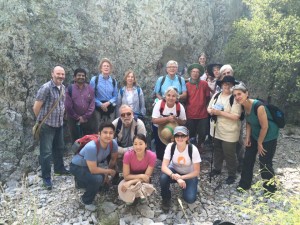
Losing Our Chains
Losing Our Chains has been reposted with permission from Blue Boat. You can find the original posting here.
Aisha Ansano is a candidate for Unitarian Universalist ministry, and serves as a ministerial intern at First Church in Boston, MA. Aisha is passionate about food as ministry, singing, and ways of building community.
Aisha participated in this summer’s Thrive Young Adult leadership school for Unitarian Universalistyoung adults of color. – ed.

Altar with ancestor objects in our chapel.
The five days I spent with my Thrive Young Adult cohort were vibrant and life-giving. So many parts of it stand out, moments that were uplifting, and challenging, and heart-breaking. New friends who I knew would be beside me every step of the way as I moved forward in my life. And new practices that I could engage with to deepen my own life. Every morning, a different member of our cohort led us in a short spiritual practice. It was the best way to start the day: all gathered in the chapel, bellies full of breakfast, sharing a sacred moment together before diving deep into our training and sharing.
One morning, Sara gathered us in a circle and told us that she would lead us in the Assata chant. I didn’t know what that meant, but when she recited it to us, I recognized it. “It is our duty to fight for our freedom. It is our duty to win. We must love and support one another. We have nothing to lose but our chains.”
I couldn’t remember where I had heard it before. I knew that Assata was Assata Shakur, but I didn’t know anything about her. But I was open to trying something new.
Sara asked us to repeat the chant after her, line by line. We did. She asked us to do it again. We did. Again, and again, and again, and again, louder and louder each time, until the chapel rang out with the sounds of us all shouting at the top of our lungs: “IT IS OUR DUTY TO FIGHT FOR OUR FREEDOM! IT IS OUR DUTY TO WIN! WE MUST LOVE AND SUPPORT ONE ANOTHER! WE HAVE NOTHING TO LOSE BUT OUR CHAINS.” I had goosebumps all over my body, tears gathering in my eyes. I looked around the room at our cohort as we chanted over and over and over again. I wasn’t just saying those words any more. I believed them with every fiber of my being, and believed that the people in that room were going to be flanking me every step of the way to freedom. It was not just my duty to fight for freedom and to win. It was OUR duty, together.
Sara stopped, suddenly, and we all stopped with her. The chapel filled with silence as our echoes faded away. We stood in that silence, looking at one another, soaking up what had just happened. I felt blessed, not in the hashtag-y way, but in the way that made my whole self feel alive and loved.

Aisha shares at Thrive Young Adult.
This was only 15 minutes in the midst of 5 full days, during which I felt blessed again and again. I left Thrive feeling the presence of my cohort alongside me as I began to work on the sermon I was giving that week, entitled “Leaning to Build Community.” As a minister in formation, I had guest preached a lot, but usually shied away from talk about race. As a minister of color in this predominantly white denomination, I struggled with how to talk about race from the pulpit as a way that felt authentic to my life experiences. I wanted to challenge people, but not stir the pot too much—what if people were angered by what I had to say? But after participating in the Assata chant, and after all the other experiences I had at Thrive, I wasn’t scared to speak up.
In my sermon that Sunday, I told the congregation about Thrive, and how formative my experience there had been, how amazing that community had been despite only spending 5 days together. I talked about being at a rally where a Black Boston city councilor claimed her right to be angry in the face of what is happening in the world, her responsibility to be angry, and how striking that was to me. I reminded them so many people, especially people of color, are silenced when it comes to having particular emotions. I told them about how a former coworker had told me he was scared of me, because I showed my anger and frustration about our difficult job, and I told them how self-conscious that made me, to be cast as an angry Black woman who should be feared.
I talked about race in that sermon, and I talked about it personally, not quoting books and articles, but telling them my own experiences. I stood in the pulpit in front of a group of mostly white people and I told them what my life was like as a young woman of color. It was liberating. I don’t think it would have happened without Thrive.
In September, I was invited to guest preach in Kennebunk, ME. I chose the topic of darkness, once that I had given short reflections on before. The last time I had given a homily on darkness, I had touched a bit on the question of how our metaphors of darkness and light reflect and inform our societal ideas about race, using excerpts from a beautiful sermon by Jacqui James, a UU religious educator. I used it again, this time not just to the small group of 20 who had gathered at the service where I had last reflected on darkness. This was to a whole congregation, one I didn’t know, in a place I assumed might be even less diverse than churches in the Boston area (which may or may not actually be true). In the week leading up to my sermon, we learned about the murders of Keith Lamont Scott and Terence Crutcher. My sermon talked about race even more than it previously had.
I spent the days before my drive up to Maine pretty anxious. What was the receiving line going to look like? Were congregants going to be angered by my discussion of implicit bias, and my calling out of the much-used and often well-loved metaphors of dark and light? I was worried that I might actually feel unsafe after giving that sermon.

The women and non binary folks of color at Thrive Young Adult take a selfie!
But through all this anxiety, I never once questioned whether I should give that sermon. My anxieties about people’s reactions never even changed the words I was writing. Despite my very intense stress about what my words might provoke, it honestly never occurred to me that I could just write something else. Because really, I couldn’t. That was the sermon I needed to give.
In the midst of my anxiety, I reached out to my Thrive cohort to let them know how I was feeling. They responded with such love. I carried them with me that morning, envisioning them sitting in the pews and standing next to me in the pulpit
I might have preached a sermon like that one before Thrive. Earlier in the summer, in the wake of the murders of Philando Castile and Alton Sterling, I had preached at my home church about my own self-care in the wake of that news. But that was my home church. People I knew, and who I knew would be on my side, were physically present in the room, and I could look them in the eye as I spoke, seeing their encouragement and love radiating outward. In Kennebunk, it was just me. But I felt love and encouragement radiating towards me anyway, from my cohort around the country, and from myself.
Thrive gave me a cohort of new friends who I could talk to about race and racial justice. Beyond that, it gave me more confidence in myself, confidence to trust my own experiences and that they needed to be heard. I have nothing to lose but my chains. Our denomination has nothing to lose but its chains. Thrive gave me the strength to learn to fight for freedom, and people to do it with.
To learn more about GROW Racial Justice and to apply for the June 2017 iteration, visit https://uucsj.org/grow-racial-justice/



 Heart
Heart Hands
Hands
